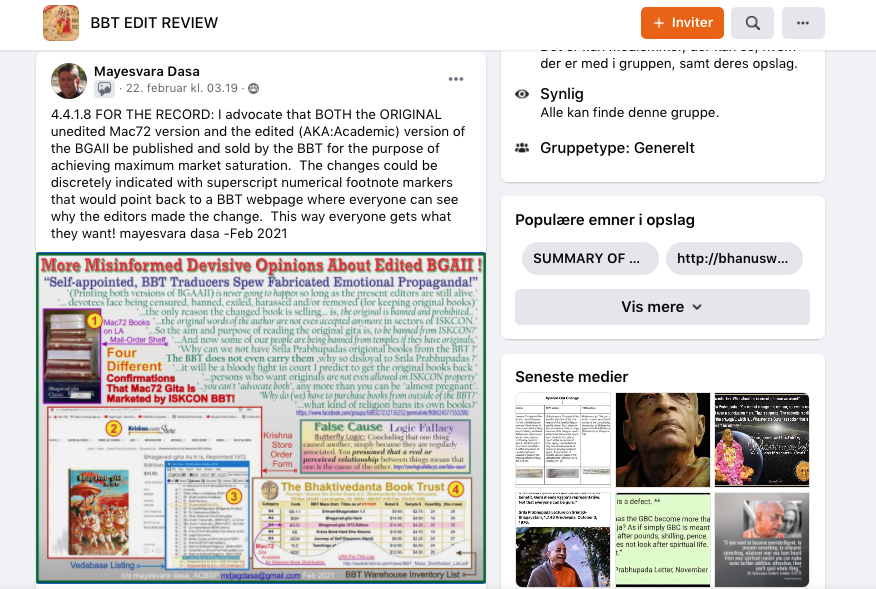Help us by “liking” and “sharing” this post!

Re-posted from krishna.org
The thoughts and the effects of such revolutionary literature are required. Not the grammatical. The so-called rascals, they are concerned with the grammatical. But those who are actually worker, they are concerned with the thoughts…
1972 Conversations, January, 1972, Room Conversation Including Discussion on SB. 1.5.11 — January 19, 1972, Jaipur, 720119RC.JAI
Prabhupada: These people or this revolution is meant for killing the sinful resultant actions of the people. This revolution. Janata agha, agha means resultant action of sinful life. Janata agha viplavah. Viplavah means revolution, this very word is used. Tad-vag-visargo janatagha-viplavo yasmin prati-slokam abaddhavaty api[ SB 1.5.11]. Such revolutionary literature, even they are not properly composed. Yasmin prati-slokam abaddham. Not according to the grammatical rules and other rhetorical rules, but the, I mean to say, thoughts and the effects of such revolutionary literature is required. Not the grammatical. The so-called rascals, they are concerned with the grammatical. But those who are actually worker, they are concerned with the thoughts. What is the thought is there? Therefore, it is said that tad-vag-visargo janatagha-viplavo yasmin prati-slokam abaddhavaty api, namany anantasya yaso “nkitani yat[ SB 1.5.11].
If there is simply the attempt is there how to glorify the Supreme Lord, that is a fact. It doesn”t matter whether it is written in correct language or incorrect language, it doesn”t matter. If the whole thought is targeted to glorify the Supreme Lord, then namany anantasya yaso “nkitani yat grnanti gayanti srnvanti sadhavah. Then those who are actually sadhu, even in spite of all these defects, because the only attempt is to glorify the Lord, then those who are sadhu, those who are devotee, they hear it. Srnvanti gayanti grnanti. Not only hear, they chant also the same thing. And not only chant, but grnanti, they apply in their actual life.
This is the Bhagavata sloka. Is it clear now? Yes. Tad-vag-visargo janatagha-viplavo[ SB 1.5.11]. If the thought is revolutionary for transcendental realization, even it is not properly composed from grammatical and literary point of view, because the attempt is there for glorifying the Supreme Lord, all devotees, all great sages, saintly persons, sadhavah, grnanti, they accept. Yes. Grnanti srnvanti, hear with attention, and gayanti, and chant also. This is the principle. The only center is whether it is meant for awakening God consciousness. That is the central point, not the language(?). But it does not mean that it should not be correctly written. Correctly or incorrectly, if it is spoken by realized soul, that is important. Srnvanti gayanti. Somehow or other, if the attempt is to glorify the Supreme Lord; otherwise, if the attempt is to kill the Supreme Lord… Just like Dr. Radhakrishnan, what is the value of such erudition? A rascal. That is called (Sanskrit), jugglery of words. It has no value.
Anyone who is trying to present… Just like Aurabindo, he has no idea what is Krsna and writing so many nonsense things. Vivekananda, he has no idea. Dr. Radhakrishnan. Rabindranath Tagore, he has no idea what is God, but he is writing Gitanjali. That should be tested by life. Caitanya Mahaprabhu speaking apani acari prabhu jivere sikhaya, He behaves Himself perfectly and then teaches how to become a devotee. He is mad after Krsna, He is falling down in the sea. You see? So that is wanted. And the Bhagavata also says, sa vai pumsam paro dharmo yato bhaktir [SB 1.2.6], how one has increased his devotion and love for Krsna, that is the test of it. Not these formalities. Another place Krsna says, api cet su-duracaro bhajate mam ananya-bhak. Even suduracarah, even not well behaved but unflinching faith in Krsna, sadhur eva sa mantavyah [Bg. 9.30], he is sadhu. Don”t consider about his misbehaviors. That is not consideration. That will be corrected. Because he has taken to Krsna consciousness, gradually those things, those defects will be corrected. ksipram bhavati dharmatma sasvac-chantim nigacchati, he will become very soon a great religious soul because he has taken to Krsna.
So in the beginning if there is some defect, we should not consider that. We have to see how much his love for Krsna has increased, that is the test. Not the formalities. That is the test, how much he has sacrificed for Krsna, how much he is prepared to sacrifice for Krsna. If one takes Krsna for making business, that is different thing, that is not devotion. Salagrama, my Guru Maharaja used to say salagram bir badam hoy (?). Just like you have seen salagrama. So if somebody takes that and breaks peanuts, so there is no devotion. It is a show during, attracting the visitors, it is nicely decorated, but in their absence, take it and you will have stone. So all this mostly the temple show is going on like that. They have made it a show of business. The devotees will come and pay something and I may have devotion or not devotion, it doesn”t matter. One should be baccha bankaram suci (?), inside and outside perfect.
tad-vag-visargo janatagha-viplavo
yasmin prati-slokam abaddhavaty api
namany anantasya yaso “nkitani yat
srnvanti gayanti grnanti sadhavah
[ SB 1.5.11]
And then against this,
na yad vacas citra-padam harer yaso
(jagat-pavitram) pragrnita karhicit
tad vayasam tirtham usanti manasa
na yatra hamsa niramanty usik-ksayah
[ SB 1.5.10]
Na yad vacas citra-padam harer yasah. You can present a literature very perfect from literary point of view, from metaphor and poetical, rhetorical, very perfectly written, citra-padam, attractive by language. Na yad vacas citra-padam, such kind of literature, if there is no description of the glories of the Lord, na tad vacas citra-padam. Just like there are so many sex literatures, very attractive, it is selling like anything. But we are not interested in those rascal literatures. Tad vayasam tirtham, such literature is considered as the place of enjoyment of the crows. Vayasam means crow. The crow take enjoyment in the garbage, you have seen? They won”t go in a nice place. They will come all together. Just like vultures, they come together to take pleasure in a corpse, dead body. But a white swan, raja-hamsa, he goes to a place where there is nice water, lilies and lotus and nice trees.
You have seen that St. James Park? They will find out such nice place. They won”t go to imitate the crows. The crows-like people will take pleasure in such nonsense literature, sex literature, or any such literature. So many nonsense literatures nowadays they are having good sale. Because people are becoming crows-like, they have no high idea, they have no sense of Krsna consciousness, naturally they will take. Just like hippies, they have become all bad taste, crows-like.
So we have to become swans, raja-hamsa, paramahamsa, paramahamsa. Paramo nirmatsaranam. Then you can understand Krsna consciousness. If you remain crows, then you cannot, that is not possible. By nature”s example we have to see if crows-like and swans-like, pigeons-like, birds of the same feather. Birds of the same feather flock together, is it not? So you have to change your feather, then he will be pleased. If you keep your feather crows-like, then you cannot mix with the swans, that is not possible. This is the test. There are classes of men like crows, and there are classes of men like swans. So we are preparing our devotee… (aside) What is that?
Devotee (1): Is anybody watching?
Devotee (2): No.
Prabhupada: So Krsna consciousness means swan-like, they should be like swans. Their behavior should be like swans. They should live in clean place, at refreshing place. So as soon as somebody will come to the temple, he will be… (aside) You have some papers I shall show?
Syamasundara: I just wanted to check and see if there”s somebody here. It”s Nanda-kumara.
Prabhupada: So keep this principle in view, that you have to become swan, not crows. They say that everyone, every religion is all the same. This is all nonsense. (indistinct) In Bhagavad-gita there are different types of religion, sattvic, rajarsic, tamasic. And our this… If you take it as religion, this is transcendental. Sa vai pumsam paro dharmo [SB 1.2.6]. Parah means transcendental, it is not ordinary, aparah.
In aparah dharma, the materialistic dharma, there are ritualistic ceremonies how to make one perfect for accepting transcendental religion. But this Krsna consciousness is directly putting oneself in the transcendental. That is the special (indistinct). Caitanya Mahaprabhu… (aside) Why don”t you close it?
Caitanya-caritamrta says, krsne bhakti kaile sarva-karma krta haya. If you become Krsna conscious, then it is to be supposed that you have finished all other types of religion. My Guru Maharaja used to cite one example that one”s friend was sitting on the high court judge”s bench. So he was speaking to another, “Oh, that Panchu was playing with us naked. He is sitting on the high court judge”s bench. Oh, how he was playing with us naked, how he is seated in the high court bench?” “Yes, I have seen, you have seen actually he is sitting.” “Oh, then he must not be getting salary.” He must not be getting salary. So this is the argument. Familiarity breeds contempt. So he cannot believe that he has become a high court judge. He thinks that “I am a rascal fool and my friend, how he can become high court judge? He must not be getting salary.” But is that very good argument that the high court judge is seated there without any salary? This argument is false(?). That is enviousness. Nirmatsarata. That is the habit of the conditioned soul. So if… (end)








You must be logged in to post a comment.